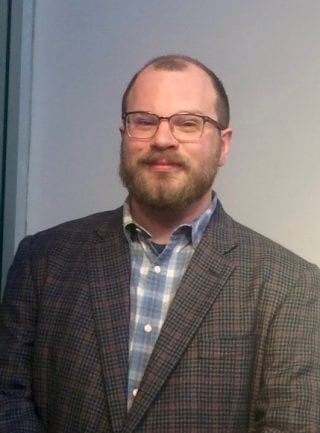A Q&A with Fulbright College Alumnus Eddie Ardeneaux IV
 Eddie Ardeneaux IV
Eddie Ardeneaux IV
Assistant Professor of English at University of the Ozarks
and 2016 Graduate of the Ph.D. in English Program
In this conversation, Ardeneaux talks about what it took to become an assistant professor, teaching a class on science fiction after WWII, his love of travel, film and television and how important it is for students to take an active role in their education and early career path.
Q: Can you tell us a little about your career, what you studied in college, and how the two relate to one another?
My career over the last decade has been in higher education. After graduating from the M.A. program at University of Georgia in 2008, I spent four years as a faculty instructor of English at University of New Orleans.
I came to University of Arkansas in 2012 to pursue a Ph.D. in English. During my five years at Arkansas—as a graduate student, graduate teaching instructor, and a post-doc instructor—I studied contemporary American fiction and film, science fiction and film, and literary theory, all while teaching a range of courses.
My studies at Arkansas, along with the teaching experience gained there, prepared me for my current job as an assistant professor at University of the Ozarks.
My many years of teaching writing and composition are directly applicable to the writing courses I currently teach, while my research into contemporary science fiction and film informs the content of courses I have taught on utopia/dystopia and, in the coming fall semester, an overview of science fiction after WWII.
Q: What has been one of the most interesting or exciting accomplishments for you in your career or life post-college?
Becoming an assistant professor was always the goal when returning to school for my Ph.D., so getting the job I worked so hard to attain over many years is exciting.
Getting an academic job has become more competitive over the years, so my current position feels like a true accomplishment.
Q: What was one of your favorite memories of your time at the college and why?
My time at Arkansas was full of interesting experiences. Two stand out at the moment.
In the first, I was teaching a course on World Literature and my assigned classroom was in the basement of Bell Engineering. I remember trying to find the classroom—an adventure in itself—then writing detailed directions for my students.
When everyone found the classroom on the first day, we had a wonderful bonding moment, as if we had all solved a mystery together.
In the second, my involvement with Graduate Student Congress really provided insight into how the university works.
Meeting graduate students from across campus, learning about their experiences, and benefiting from their commitment to improving the graduate student experience expanded my connection to Arkansas and showed me how much potential the university has to provide a stellar education in so many disciplines.
Q: Now that you’ve achieved so much in your career, what advice would you give to students?
My main advice for students—whether undergraduate or in graduate school—is to be pragmatic and active in their own educations.
The “field of dreams” model of “if you study it, you will magically get your dream job” is a little outdated. Taking an active role in planning your course of study and taking advantage of the many opportunities—for funding, for study abroad, or for interaction with the work faculty do—will allow you to tailor your own experience toward the future you hope to build.
The degree itself is only part of the equation: the more and varied experiences you can cultivate over your time in school will save you from the disappointment of vague or general expectations.
Make your educational experience what you want it to be.
Q: What do you like to do during your time outside of work?
To a large degree, I have been able to combine my work life with my interests, so my work life and normal life converge.
For me, this convergence means the reading I do, the films and television I watch, and the places I travel all connect to making myself a better educator and researcher.
What this really means is I have an excuse to drink lots of coffee, read lots of interesting novels, and have lots of compelling conversations with people. I also squeeze in some chess where I can (mostly online these days).
Q: What’s up next on the horizon for you?
I’m really just starting my path as an assistant professor, so for now my goal is to cultivate my position to the best of my ability.
I also hope, now that school is done, to do more traveling. Before coming back to school at University of Arkansas, I had the opportunity to teach abroad in Prague, Czech Republic.
It would be great to incorporate more travel into my professional life, which was a large part of its appeal from the start.
Q: Is there anything else you’d like to add or let readers know?
As a parting shot, I would insist on the idea of taking an active role in your education and early career goals as crucial to receiving the full benefits of an education.
If you can build the pieces over time, stringing together experiences and opportunities, you will have much better odds of getting where you want to go.
Don’t let your education be a passive experience.

